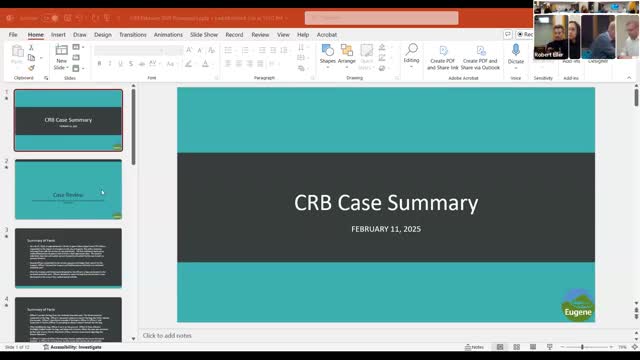Citizen Review Board reviews July 15, 2023 search; members split on truthfulness, conclude search likely unconstitutional
Get AI-powered insights, summaries, and transcripts
Subscribe
Summary
The Citizen Review Board reviewed a July 15, 2023 Eugene Police Department response in which officers located a bag later found to contain a firearm; the Lane County District Attorney flagged concerns and the auditor recommended sustained findings on some allegations while the chief reached different conclusions, prompting a split, detailed deliberation.
The Citizen Review Board spent the bulk of its meeting reviewing a July 15, 2023 Eugene Police Department response to a burglary report in which officers located a suspect and a second person in a fenced side yard and later found a bag that contained a firearm.
Rob (case reviewer) told the board the sequence: officers responded about 1:49 a.m., located the suspect and a second person (referred to in reports as a victim) in an enclosed side yard, and recovered a bag the victim claimed as his. The victim denied officers’ requests to search the bag. According to the review, Officer C carried the bag to the marked patrol area, then Officer D set the bag on the ground, used a flashlight and observed a firearm inside. The Lane County District Attorney’s Office later raised concerns about the circumstances of the firearm discovery, prompting an auditor’s review and recommendations.
The auditor’s memo described three allegations against Officer D: (1) truthfulness — allegedly failing to be honest about how the firearm was discovered, including not reporting that he manipulated the bag; (2) an unconstitutional search — allegedly manipulating the bag and exposing its contents without a warrant or valid exception; and (3) coercion — allegedly attempting to coerce consent to search by suggesting the victim could be charged if he refused. A single allegation was identified for Officer C: that the officer failed to submit a true, accurate and complete report describing what occurred with the bag.
According to the materials the auditor presented to the board, the auditor’s office recommended sustaining allegations (1) and (2) against Officer D and finding insufficient evidence for allegation (3). The chain of command and the chief reached different conclusions: the chief’s recommended outcome (as summarized in the presentation) found insufficient evidence on the first allegation, sustained the second and unfounded the third. For Officer C, the auditor recommended insufficient evidence and the chief recommended unfounded. Board members discussed those differing recommendations at length and cited the body-worn video shown to the board as the primary evidentiary basis for their deliberations.
Discussion focused on two legal and practical issues: (a) whether Officer D’s actions constituted an unconstitutional search of a closed container absent a warrant or recognized exception, and (b) whether omissions and shifting descriptions in the officer’s report and interview met the auditor’s definition of an untruthful statement. Board members and staff noted that search-and-seizure law is heavily dependent on case law and circumstance — including Ninth Circuit precedent — and that evolving rulings can change assessments of what a lawful search is.
Several members and staff called attention to the value of body-worn video for reconstructing events, and to the procedural complexity in deciding whether an apparent constitutional violation should be adjudicated administratively or decided in court through motions to suppress. Some members recommended additional or refreshed training on search-and-seizure law and clearer report-writing expectations; others urged caution before labeling conduct “untruthful,” noting the substantial personnel consequences of sustained truthfulness findings.
Board members stated their provisional positions during the deliberation (members’ statements as recorded in the transcript): several members said they agreed with the auditor that there was insufficient evidence on some items and sustained findings on others; other members aligned with the chief’s more restrictive standard for sustaining a truthfulness finding. The board did not record a single unanimous roll-call tally in the transcript for each allegation; the meeting record shows multiple individual positions and a close, contested deliberation on truthfulness versus procedural error.
Members concluded with a mix of recommendations for training and for continued attention to search-and-seizure case law; they also asked staff to ensure officers have clear guidance about when to seek warrants, and to consider peer coaching so officers challenge potentially problematic on-scene decisions. The board’s discussion noted the potential effect of problematic searches on prosecutions and the value of preserving evidence chain integrity.
The materials the board reviewed included the auditor’s report, body-worn video excerpts and the Lane County District Attorney’s office correspondence that raised the complaint.
